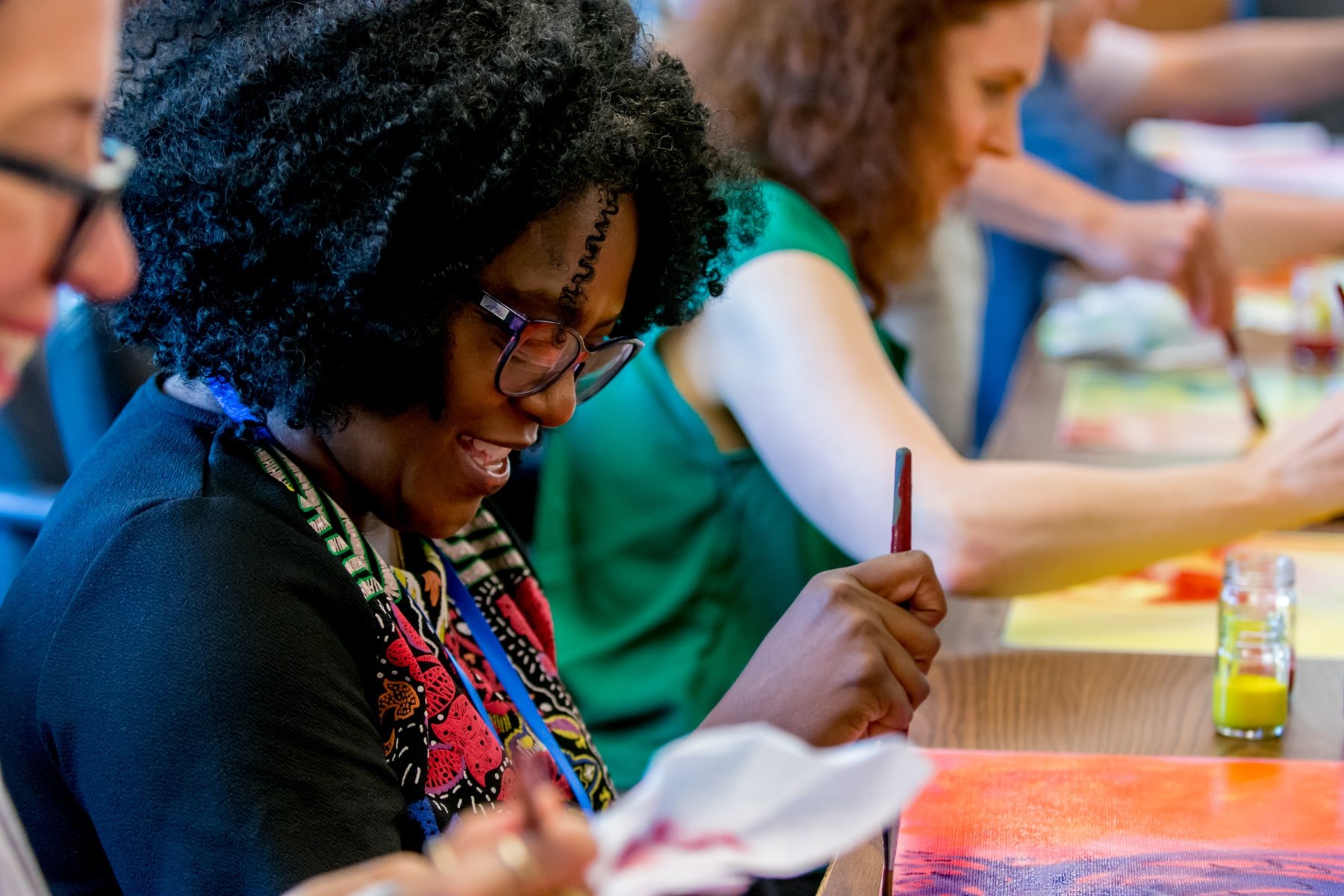Frequently Asked Questions
-
• nhs will receive a welcome email from info@innr.uk within 48 hours.
• In your welcome email you will be offered your first of three Zoom neuro-education sessions where you can find out more about the 12 creative thinking skills. These can be arranged by mutual agreement and scheduled just before or just after the start of the course of group sessions. The second will be midway through and the third at the end of the course.
• You will also be asked to provide a few essential details including your NHS role, any accessibility requirements, and your GP’s contact details. You will also be given the option to provide your personal pronoun preference if you so wish. -
An integrated arts-based neuroeducation to build resilience and reduce symptoms by simultaneously exercising multiple neural processes, involving cognitive, limbic and motor areas.
This is achieved through a novel combination of artistic activities, alongside neuroeducation into 12 specific components of cognition, and three levels of emotion.
This approach offers the possibility of long-term, self-sustaining benefits.
-
Those wishing to enhance their creativity, and their problem-solving and innovation skills, both as individuals and collaboratively.
Those seeking to build mental health resilience.
Those seeking support for the symptoms of mild to moderate depression, anxiety or PTSD.
-
A course of three sessions which will facilitate identifying and observing:
The 12 capacities for thinking from the Creative Thinking Skills Spectrum.
The three expressions of emotion: as state, experience and concept.
The difference between unique personal symbolic language and shared symbolic language (both verbal and non-verbal).
An eight to twelve-week course involving two hours per week in group sessions of artistic activities to practise and observe the Creative Thinking Skills Framework in action. These activities require no prior knowledge or skill and consist of:
Singing (20 mins)
Eurythmy movement therapy (30 mins), and
Colour exercises in the wet-on-wet painting style (50 mins).
-
Cognitive deficits and hippocampal dysfunction are significant features of depression, anxiety and PTSD.
Cognitive deficits have been shown to benefit in different ways from cognitive, movement and arts-based therapies, which have in turn been shown to be associated with beneficial adult hippocampal neurogenesis.
The full course integrates these benefits to enhance the overall effect.
The methods used also enhance creativity and problem-solving.
-
Rudolf Steiner house, 35 Park Road, London, NW1 6XT.
Bespoke courses by arrangement by arrangement.
Neuroeducation sessions will be offered via Zoom or in person.
Times by arrangement.
-
• All art materials are provided free of charge.
• The paints we will use are water soluble. You may wish to bring something to protect your clothes from occasional splashes during painting.
• It would be best to wear comfortable clothes for Eurythmy.
• We advise that you purchase a pair of eurythmy shoes, or similar, for yourself. These are illustrated in the photograph on the home page, and are available from Amazon and other retailers. They are soft and flexible with a full sole. -
Up to a maximum of 25 per group.
-
Prices start at £500 for a full course (excluding special NHS or HE concessions).
Time costs: 12 x 2 hours (Central London on Sundays) plus three one hour neuroeducation sessions.
-
£0.
This pilot course is offered to the NHS at no cost.
Time costs: 12 x 2hours (Central London on Sundays) plus three one hour Zoom sessions.
-
A 2021 pandemic-related survey of NHS Intensive Care staff, conducted by Prof Neil Greenberg, reported that 45% met the threshold for severe depression, severe anxiety, or post-traumatic stress disorder (PTSD).
Long term stress is also now impacting NHS frontline staff.
-
• Attending all 12 weeks would be ideal, but this is not a requirement.
• We recognise the difficulty for NHS shift workers to attend all 12 weeks, and will work with that. Please attend as many as you can
• optional activities to practice at home, and materials, will be provided. -
The practitioners are offering their time pro bono.
Rudolf Steiner House has gifted the use of the building pro bono.
The Hermes Trust has provided a small grant for incidental costs such as the necessary insurance.
The website design has been kindly gifted.
Photographs of the wet-on-wet painting presentation by Elaine Holt at the international SOU Creativity Conference, Oregon, are courtesy of Michael D. Davis
Copper ball and hands photograph courtesy of Eurythmy Therapy International
-
Name
Gender pronoun preference (optional)
NHS role - required only for courses reserved for pandemic-affected NHS staff, and for verification purposes only
Email address - for registration and notification purposes
GP name and address - for your safety
-
Contact data will be stored securely on an encrypted hard drive.
Any notes taken during the one-to-one neuroeducation sessions will be securely stored, then destroyed no later than one year after the end of the course.
Participants will be reminded at the beginning of each group session that they should respect the confidentiality of personal information or experiences shared by other participants.
Where there are concerns about safety, the GP may need to be informed.
-
Participants will be free to discontinue participation at any point and without notice or explanation.
A safeguarding statement is provided, with particular regard to vulnerable persons.
The practitioners are experienced in their field, with the relevant qualifications and/or experience.
INNR offers complementary therapy or training, and is not intended to replace medical treatment, or medical advice, which is the responsibility of your GP.
There is the facility to lodge compliments, concerns, or complaints in writing via the website feedback form. These will be answered and will also be used to inform regular reviews of practice, and best practice guidelines.

